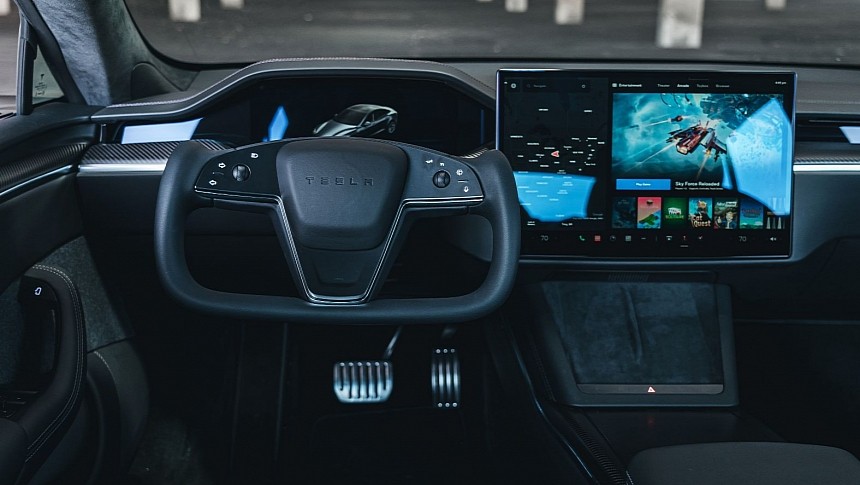Never mind IoT (Internet of Things) appliances scattered around your house and the sometimes gross invasion of privacy they can provide for you. The IoC (Internet of Cars) has slowly emerged in recent years, and we might be heading into a genuinely dystopian future from a privacy perspective because of it.
New research shows that modern cars can gather more than enough data about your whereabouts, biometric data, and even your sex life over time. That's not necessarily the bad news, but most carmakers are already selling the data they collect from you to third parties.
George Orwell's 1984 was written about three-quarters of a century ago as a science-fiction novel and a cautionary tale about the future. The namesake movie from the 1980s was also part of the Sci-Fi genre, but the way things are going, part of it could soon be classified as a documentary.
How often do you meticulously review all the intricate details when purchasing a modern vehicle? When I mention "new car," I'm not referring to something ultra-modern, luxurious, and filled with tech, but simply cars equipped with "connected services" that encompass features from in-car Internet radio to real-time weather updates and traffic alerts for the navigation system. Those encompass at least 90 percent of all new cars sold in recent years.
As most of you know, contemporary automobiles rely on various data-gathering instruments, including microphones, cameras, and the smartphones drivers link to their vehicles through Android Auto or Apple CarPlay.
Automakers also accumulate data through their own apps and websites, sometimes opting to distribute or exchange it with external parties, making you, the car's owner, a product.
The Mozilla Foundation, established in July 2003, is a non-profit organization based in the United States. Its primary mission is to support and collaboratively oversee the open-source Mozilla project, including the Firefox Internet browser.
Apart from that, the foundation sometimes indulges in tech product reviews from a privacy perspective, and it recently conducted a rather intricate study on no less than 25 carmakers active in the United States and Europe.
Out of the 25 car brands examined in Mozilla Foundation's research, each one received the company's "Privacy Not Included" warning label. This designation officially places cars in the category of products with the poorest privacy features they have ever assessed.
Unsurprisingly, Tesla was the worst offender of the carmakers tested, but things don't look dandy for either of them.
All carmakers apparently collect and use way more data and personal information about their cars' owners than it is necessary to operate their vehicles and manage the brand's relationship with its customers.
Modern vehicles can gather personal data through various channels, more than you would imagine. This includes information on how you engage with your vehicle, the connected services utilized within the vehicle, the car's dedicated app - often serving as a one-way portal to your smartphone data - and even more data sourced from third-party providers like Sirius XM or Google Maps.
What kind of data, you ask? Well, this spying mission encompasses a wide range of data, from medical and genetic information to potentially even aspects like one's intimate life. Moreover, it can track your driving habits and how fast you drive, frequently taking routes, and even the music you choose to play in your vehicle.
The collected data doesn't stop there; it's often used to create additional information through "inferences," which can include assessments of your intelligence, abilities, and interests, among other things. 1984's Big Brother would be proud. Heck, the new Mercedes-Benz E-Class W214 has Tik Tok preinstalled on its infotainment system, and more than one modern cars even have cameras both inside and outside the vehicle.
The research conducted by the Mozilla Foundation revealed that a significant majority, specifically 84 percent of the car brands studied, can share your personal data with service providers, data brokers, and various other adjacent businesses.
Even more concerning is that nineteen of these car brands, accounting for 76 percent of those studied, claim the ability to sell your personal data outright. In other words, you might also be funding a carmaker's data-selling side business whenever you drive your car.
Furthermore, a rather unexpected discovery was made, as 56 percent of these carmakers indicated their readiness to share your information with government entities or law enforcement, and this could be triggered by a mere "request." This doesn't necessitate a stringent court order but could be as simple as an "informal request."
On top of all this, all the carmakers studied seem to fail to keep their cybersecurity risks at a minimum. After reviewing examples going back only three years, the Mozilla Foundation found that no less than 17 of the 25 car brands have had a security leak, hack, or breach involving their customers' privacy.
To make things worse, only two carmakers, Renault and Dacia, somewhat excelled in the data control category of the analysis by leaving their customers the right to request the deletion of their personal data.
Coincidentally, the two car brands operate under the same umbrella, primarily in Europe, which has been protected by the robust General Data Protection Regulation (GDPR) privacy law. The other 23 carmakers tested seem to push the boundaries of what they can legally do with your personal data as long as there are no direct consequences for them.
We've seen proof that modern cars have been susceptible to hacking for almost a decade, and integrating the Internet of Things (IoT) adds an entirely new dimension to these security threats.
Remote hacking goes beyond simply unlocking your car's doors; it can potentially grant complete control over your vehicle, particularly with the prevalence of drive-by-wire controls in modern cars, essentially turning them into rolling robots.
While we're not on the brink of succumbing to our robot overlords domination, it's essential to consider that we're nearing the advent of Level 4 SAE autonomous driving, which is just around the corner, as Level 3 is already here. This advancement in autonomous driving technology brings potentially even more concerning implications from a security perspective.
From the 25 carmakers analyzed, Tesla's personal data security mishaps were closely followed by Japanese brands like Nissan/Infiniti and Honda/Acura, Korean like Hyundai/Kia, and all General Motors' car brands. That doesn't mean that premium German carmakers like Mercedes-Benz or BMW fared much better.
General Motors boasts an impressive fleet of approximately 11 million vehicles equipped with 4G-LTE connectivity. Moreover, a vast majority of new cars from automakers such as Audi, BMW, Toyota, Volkswagen, and Mercedes-Benz either come with built-in internet connectivity or offer it as an optional feature.
There is currently no sure way to be completely safe from all of this, apart from driving a classic forever, but here are some tips for protecting your privacy while driving a modern car, or after selling it:
Welcome to the future. Welcome to 1984.
George Orwell's 1984 was written about three-quarters of a century ago as a science-fiction novel and a cautionary tale about the future. The namesake movie from the 1980s was also part of the Sci-Fi genre, but the way things are going, part of it could soon be classified as a documentary.
How often do you meticulously review all the intricate details when purchasing a modern vehicle? When I mention "new car," I'm not referring to something ultra-modern, luxurious, and filled with tech, but simply cars equipped with "connected services" that encompass features from in-car Internet radio to real-time weather updates and traffic alerts for the navigation system. Those encompass at least 90 percent of all new cars sold in recent years.
As most of you know, contemporary automobiles rely on various data-gathering instruments, including microphones, cameras, and the smartphones drivers link to their vehicles through Android Auto or Apple CarPlay.
Automakers also accumulate data through their own apps and websites, sometimes opting to distribute or exchange it with external parties, making you, the car's owner, a product.
The Mozilla Foundation, established in July 2003, is a non-profit organization based in the United States. Its primary mission is to support and collaboratively oversee the open-source Mozilla project, including the Firefox Internet browser.
Apart from that, the foundation sometimes indulges in tech product reviews from a privacy perspective, and it recently conducted a rather intricate study on no less than 25 carmakers active in the United States and Europe.
Out of the 25 car brands examined in Mozilla Foundation's research, each one received the company's "Privacy Not Included" warning label. This designation officially places cars in the category of products with the poorest privacy features they have ever assessed.
Unsurprisingly, Tesla was the worst offender of the carmakers tested, but things don't look dandy for either of them.
Everyone Is a Target
Modern vehicles can gather personal data through various channels, more than you would imagine. This includes information on how you engage with your vehicle, the connected services utilized within the vehicle, the car's dedicated app - often serving as a one-way portal to your smartphone data - and even more data sourced from third-party providers like Sirius XM or Google Maps.
What kind of data, you ask? Well, this spying mission encompasses a wide range of data, from medical and genetic information to potentially even aspects like one's intimate life. Moreover, it can track your driving habits and how fast you drive, frequently taking routes, and even the music you choose to play in your vehicle.
The collected data doesn't stop there; it's often used to create additional information through "inferences," which can include assessments of your intelligence, abilities, and interests, among other things. 1984's Big Brother would be proud. Heck, the new Mercedes-Benz E-Class W214 has Tik Tok preinstalled on its infotainment system, and more than one modern cars even have cameras both inside and outside the vehicle.
The Matrix Has You, then What?
Even more concerning is that nineteen of these car brands, accounting for 76 percent of those studied, claim the ability to sell your personal data outright. In other words, you might also be funding a carmaker's data-selling side business whenever you drive your car.
Furthermore, a rather unexpected discovery was made, as 56 percent of these carmakers indicated their readiness to share your information with government entities or law enforcement, and this could be triggered by a mere "request." This doesn't necessitate a stringent court order but could be as simple as an "informal request."
On top of all this, all the carmakers studied seem to fail to keep their cybersecurity risks at a minimum. After reviewing examples going back only three years, the Mozilla Foundation found that no less than 17 of the 25 car brands have had a security leak, hack, or breach involving their customers' privacy.
To make things worse, only two carmakers, Renault and Dacia, somewhat excelled in the data control category of the analysis by leaving their customers the right to request the deletion of their personal data.
Coincidentally, the two car brands operate under the same umbrella, primarily in Europe, which has been protected by the robust General Data Protection Regulation (GDPR) privacy law. The other 23 carmakers tested seem to push the boundaries of what they can legally do with your personal data as long as there are no direct consequences for them.
Risks not Only Involve Privacy Breaches
Remote hacking goes beyond simply unlocking your car's doors; it can potentially grant complete control over your vehicle, particularly with the prevalence of drive-by-wire controls in modern cars, essentially turning them into rolling robots.
While we're not on the brink of succumbing to our robot overlords domination, it's essential to consider that we're nearing the advent of Level 4 SAE autonomous driving, which is just around the corner, as Level 3 is already here. This advancement in autonomous driving technology brings potentially even more concerning implications from a security perspective.
From the 25 carmakers analyzed, Tesla's personal data security mishaps were closely followed by Japanese brands like Nissan/Infiniti and Honda/Acura, Korean like Hyundai/Kia, and all General Motors' car brands. That doesn't mean that premium German carmakers like Mercedes-Benz or BMW fared much better.
General Motors boasts an impressive fleet of approximately 11 million vehicles equipped with 4G-LTE connectivity. Moreover, a vast majority of new cars from automakers such as Audi, BMW, Toyota, Volkswagen, and Mercedes-Benz either come with built-in internet connectivity or offer it as an optional feature.
There is currently no sure way to be completely safe from all of this, apart from driving a classic forever, but here are some tips for protecting your privacy while driving a modern car, or after selling it:
- instead of saving your exact home address on your navigation system, set it to a nearby marker such as a store, or an intersection; you'll know your way home from there;
- before selling your modern car, make sure you reset every system you've connected with in the car to its factory default - that includes clearing your synced addresses and phone contacts;
- if you have an integrated garage door opener in your car, reset it as well - otherwise your sold car will continue to act as a rolling key to your house, via the garage;
- if you are simply too afraid of your car being hacked remotely, just turn off your wi-fi and bluetooth features of your car or go for a much older model.
Welcome to the future. Welcome to 1984.









